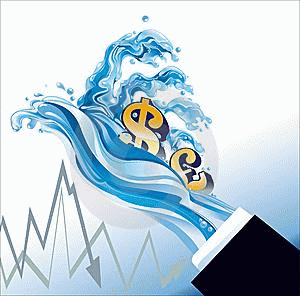Global stocks were hammered on Friday for a second straight day on news of a slowdown in China and turbulence in emerging markets. The Dow Jones Industrials suffered its worst drubbing in more than two years, tumbling 318 points on Friday to end a 490 point two-day rout. Emerging markets currencies were whipsawed by capital flight as foreign investors fled to the safety of U.S. Treasuries. Turkey's lira and the Argentine peso were particularly hard hit setting record lows in the 48 hour period. The scaling back of the Fed's $85 billion per month asset purchase program, called QE, has altered the dynamic that made emerging markets the "engines for global growth." The policy reversal has triggered a sell-off in risk assets and sent EM currencies plunging. Here's a summary from Bloomberg:
"The worst selloff in emerging-market currencies in five years is beginning to reveal the extent of the fallout from the Federal Reserve's tapering of monetary stimulus, compounded by political and financial instability.
"Investors are losing confidence in some of the biggest developing nations, extending the currency-market rout triggered last year when the Fed first signaled it would scale back stimulus. While Brazil, Russia, India, China and South Africa were the engines of global growth following the financial crisis in 2008, emerging markets now pose a threat to world financial stability." ("Contagion Spreads in Emerging Markets as Crises Grow," Bloomberg)
Paradoxically, Bloomberg editors blame the victims of the Fed's failed policy for the current ructions in the markets. In an article titled, "What's Behind the Emerging-Market Meltdown," the editors say,"emerging-market governments ... should recognize that this week's financial-market turmoil was, to varying degrees, their own fault....the best way for emerging-market governments to restore confidence would be to improve their policies."
Logically, one would assume that the editors would throw their support behind capital controls or other means of stemming the destructive flow of speculative capital into domestic markets. But that's not the case. What the editors really want, is policies that trim deficits, slash public spending, and allow foreign investors to continue to wreak havoc on vulnerable economies that follow their free market diktats. The article is a defense of the status quo, of maintaining the same ruinous policies so that profit-taking can continue apace.
The Fed was warned early on that its uber-accommodative monetary policy was spilling over into emerging markets and creating conditions for another financial crisis. Take a look at this excerpt from an article in Bloomberg back in 2010 where Nobel prize winning economist, Joseph Stiglitz, explicitly warns the Fed of the dangers of QE.
Bloomberg:
"The U.S. Federal Reserve's plan to boost purchases of bonds poses 'considerable' risks by increasing capital inflows to emerging markets, Nobel Prize-winning economist Joseph Stiglitz said in Santiago today.
"'All this liquidity that they're creating is not going back to grow the American economy and is going to Asia and other emerging markets where it's not wanted,' Stiglitz said...Increased capital inflows could cause emerging market currencies to appreciate and could create asset bubbles, he said." ("Stiglitz Says Fed Stimulus Poses 'Considerable' Risks for Emerging Markets," Bloomberg, Dec 2010)
Events have unfolded exactly as Stiglitz predicted they would, which means the Fed is 100% responsible for the carnage in the stock and currencies markets.
The policy has pumped nearly "$7 trillion of foreign funds" into EMs since QE was first launched in 2009. According to the Telegraph's Ambrose Evans-Pritchard, "much of it 'hot money' going into bonds, equities and liquid instruments that can be sold quickly...Officials are concerned that this footloose capital could leave fast in a crisis, setting off a cascade effect," Pritchard adds ominously.
Whether last week's bloodbath was just a prelude to a bigger crash is impossible to say, but it is worth noting that the Fed has only reduced its purchases by a mere $10 billion per month while still providing $75 billion every 30 days. That suggests that markets will probably face greater turmoil in the months ahead. Check out this clip from USA Today:
"'Emerging markets need the hot money but capital is exiting now,' says (Blackrock's Russ) Koesterich. 'What you have is people saying, 'I don't want to own emerging markets.'"
"The bigger fear is if the current crisis in currency markets morphs into a full-blown economic crisis and leads to financial contagion, says Matthias Kuhlmey, managing director of HighTower's Global Investment Solutions.
"'The currency story is fascinating and can be a slippery slope -- be cautious,' says Kuhlmey, adding that the Asian crisis in the summer of 1997 that started with a sharp drop in the value of Thailand's baht, turned into a broader economic crisis that engulfed Indonesian, South Korea and a handful of other countries. It also rocked financial markets." ("Why emerging markets worry Wall Street," USA Today)
So, is this the Big One, the beginning of the next financial crisis?
(Note: You can view every article as one long page if you sign up as an Advocate Member, or higher).






